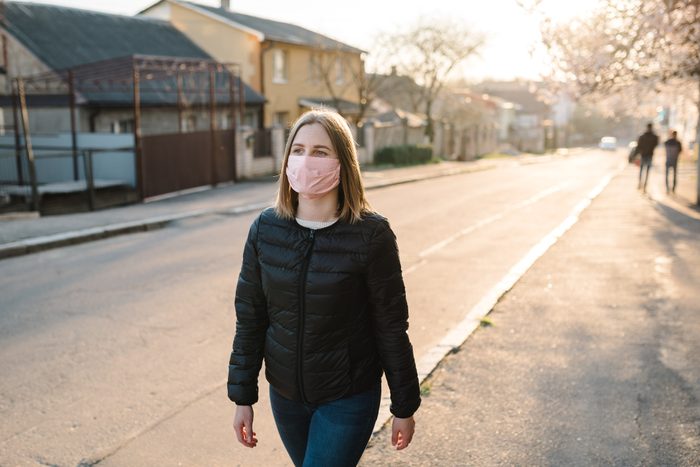
Is walking a justified risk?
Roughly two out of three Americans walk for exercise. That number may even be higher as the country tries to escape the coronavirus by skipping the gym and staying home. Since walking helps weight management and boosts mood, stepping out for a stroll is a good idea. But, when infection risk is high, controlling the virus spread is crucial. So: Is walking safe or smart?
“Yes—the immune system needs exercise to do its job at its highest level,” says David Nieman, a professor of exercise science and director of Appalachian State University’s Human Performance Lab in Kannapolis, North Carolina. “During moderate exercise like walking—and for two or three hours after—important immune cells … come out at higher rates than normal, making contact with pathogens to get rid of them.” Inactive people miss out on this advantage, says Nieman.
A couple of general tips if you’re not accustomed to walking for exercise outdoors: Wear bright or even reflective clothing to make yourself more visible; stick to sidewalks if possible; stay aware of pedestrians, bikes, and cars around you; and if you have to walk in the street, walk on the side of the road that has you facing oncoming traffic.
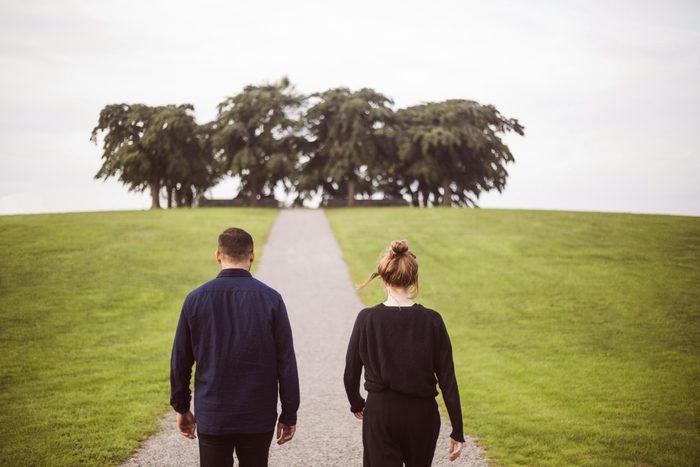
Keep your hands to yourself
Researchers have investigated the shelf-life of the coronavirus once it lands on items like a package, a pole, or a doorknob. According to the University of Alabama at Birmingham, the virus may live up to three days on surfaces such as stainless steel and plastic, for example. That means coronavirus transmission can happen when you’re out walking if you touch a park bench, water fountain, or even a pole or stoplight signal button. “Try to avoid resting your hands on anything, and if you do, don’t touch your face until you’ve sanitized or washed your hands,” recommends Allyn Resch, MD, an internist and pulmonologist for steadymd.com, a telehealth primary practice. Dr. Resch has also been working with Covid-19 patients in rural hospitals in Alabama. Keeping your hands off your face isn’t always easy because the habit is often subconscious and you might notice you’ve brushed your nose or itched your upper lip only after the fact. “If you’re sweating and wiping off your forehead, carry disinfectant wipes and sanitize your hand before—or your face after—you do it,” says Dr. Resch.
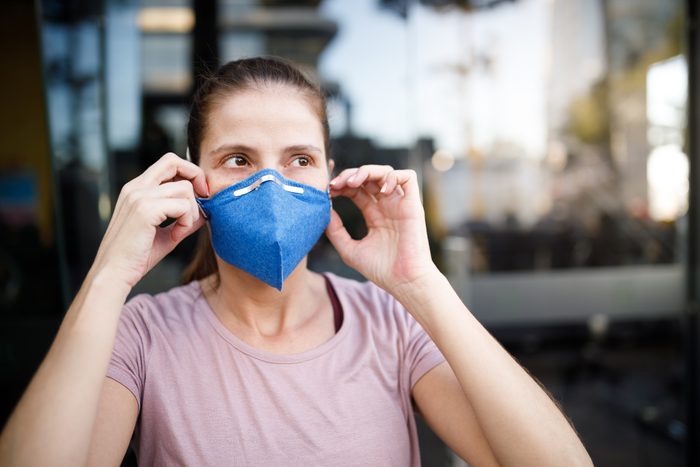
Wear a mask when walking
There’s still a lot that experts don’t understand about how the virus behaves outdoors, but the Centers for Disease and Control and Prevention says covering your mouth and nose with a cloth face cover is an important way to protect against airborne transmission of the coronavirus. “If you’re alone outdoors, it’s safe to go without, but if you’re out walking with anyone else or the park or paths are crowded, then everyone should wear masks or scarves like neck gaiters,” says Nieman, who is recognized as a pioneer in the field of exercise immunology. “This limits your potential virus droplets from spreading to companions or passersby. When they do it, too, they limit their potential spread to you.”

Stay out of the line of fire
The proven way to acquire the new coronavirus is through direct contact with an infected person’s respiratory droplets. But researchers have found that the virus can stay alive in a much smaller form called aerosols. What this all means is that Covid-19 may be present in the air you breathe. A research letter in the April 14 New England Journal of Medicine found that the new coronavirus remained alive as microparticles floating in the air for up to three hours in a lab-controlled experiment. Japanese film footage captured the suspension of these microdroplets. So on a calm day, it’s theoretically possible you could pass through a plume of virus.
While a mask is not foolproof, it may help keep out some virus from other people. You can also walk a little more strategically. “Find empty paths and if you are near others, avoid being directly behind someone so that you don’t walk into their slipstream—that plume of virus microparticles that may linger in the air,” advises Nieman.
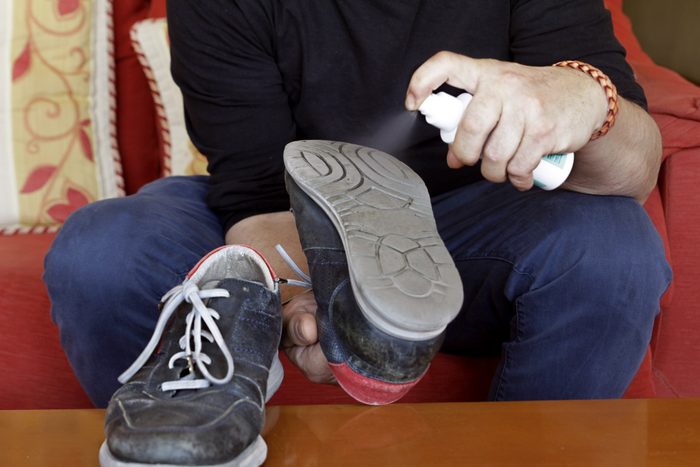
Disinfect your shoes
Respiratory droplets fall out of the air after a person coughs, sneezes, talks loudly, or even sings, and those virus particles can remain on the ground—and attach to the bottoms of your shoes. A study in the upcoming July issue of the journal Emerging Infectious Diseases found coronavirus on hospital floors; half of the ICU medical staff had shoes that tested positive, as well. Plus, the researchers detected the virus on the pharmacy floor in another part of the hospital, suggesting that the virus had traveled there by staff shoes. So, before coming into your home, use a disinfectant wipe to clean your shoes—soles, too.
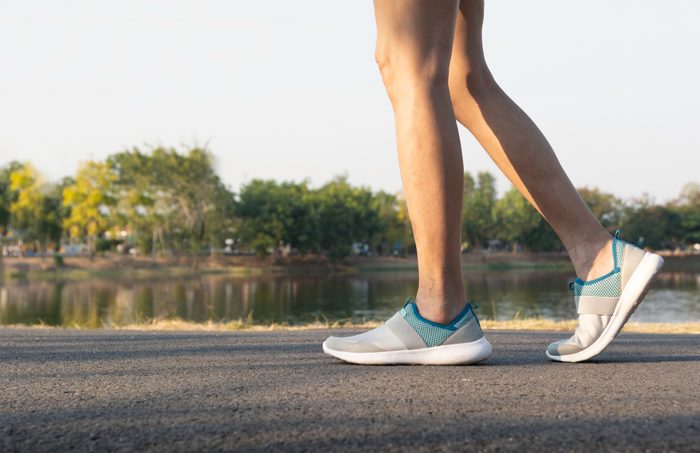
The great outdoors might be hard on the new coronavirus
All these warnings about covering up and staying safe might scare you off your daily walk. But while it’s good to be cautious when you’re walking outdoors, remember that indoor labs may not accurately reflect how the virus behaves in other environments. The Japanese researchers found that wind could blow away lingering virus microparticles in the air. Some research suggests that heat, UV-rays from the sun, and humidity might hamper the virus’s ability to spread. Just remember that the only certain thing about the virus so far is that it’s new and we don’t know a lot about it: Take reasonable precautions.
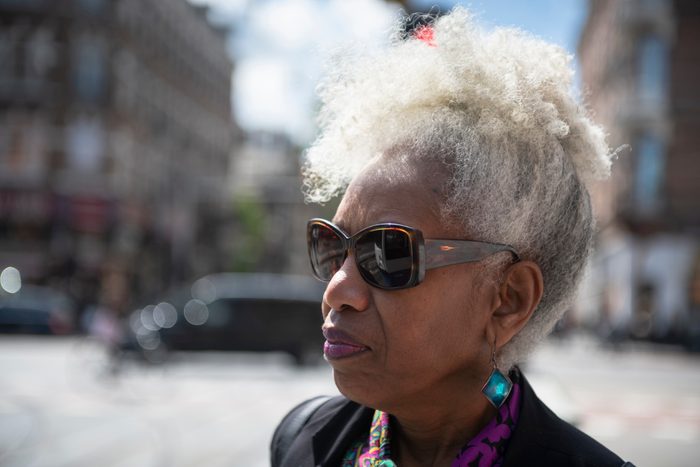
Wear sunglasses
Some research suggests that coronavirus can infect you through your eyes. Healthcare workers wear face shields over their face masks. You could try wearing close-fitting sunglasses along with your mask to gain some protection for your eyes. Health professionals who don’t have face shields have been wearing ski goggles, which should do a better job of protecting your eyes if you’re comfortable wearing them. However, if you practice proper social distancing, you should be far enough away from others to be safe.
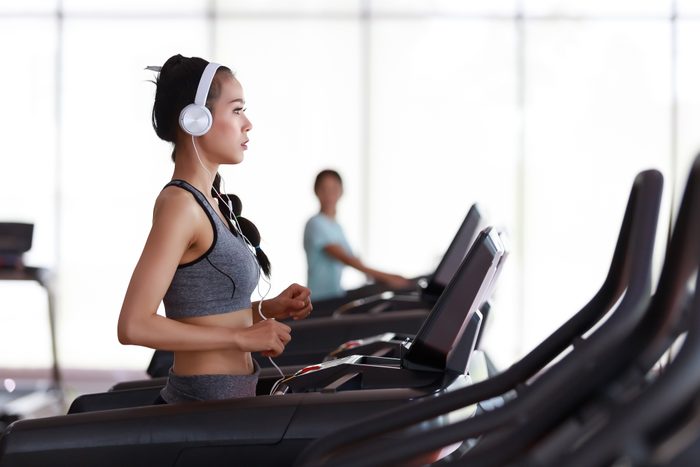
Keep it clean at the gym
You may prefer walking on a treadmill. As many cities are starting to open back up, gyms may follow suit. Keep in mind that the health club environment post-Covid-19 is likely to be drastically different. Social distancing will be strictly enforced to prevent exposure and reduce the risk of super-spreaders—people who appear healthy and don’t show symptoms but are still be transmitting the coronavirus. Inquire about the anti-virus policies your gym is implementing. Even if a full array of protective procedures isn’t in place, you can come equipped with your own mask and disinfectant wipes to clean the treadmill, stair climber, or elliptical before and after use. Make sure you wipe the control panel, handles, and the pedals since research suggests that the coronavirus can linger for hours or even days. Next, don’t fall for these 19 coronavirus myths.
